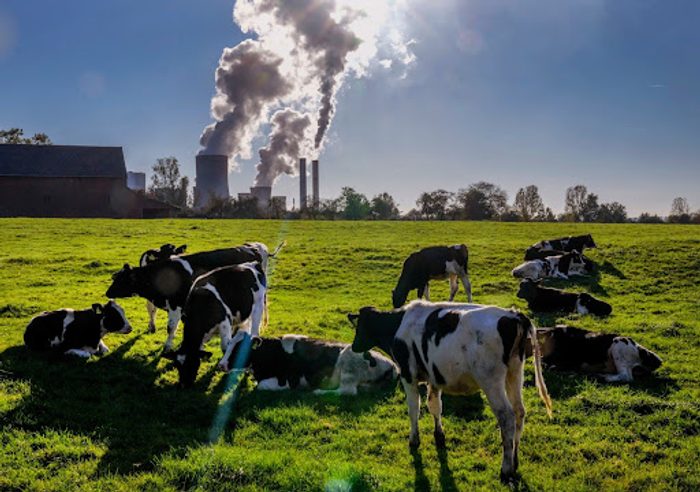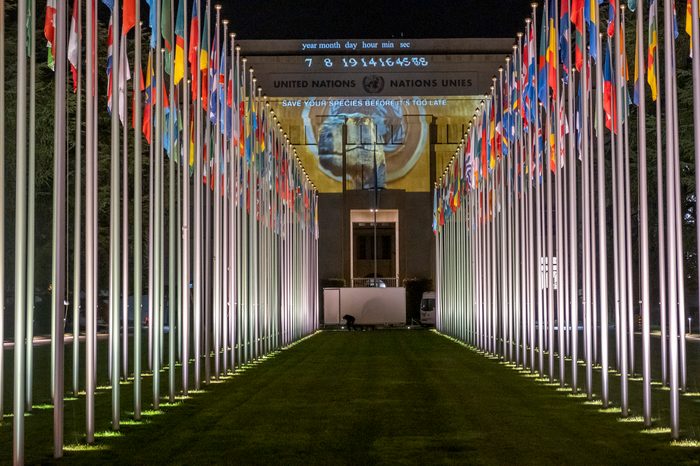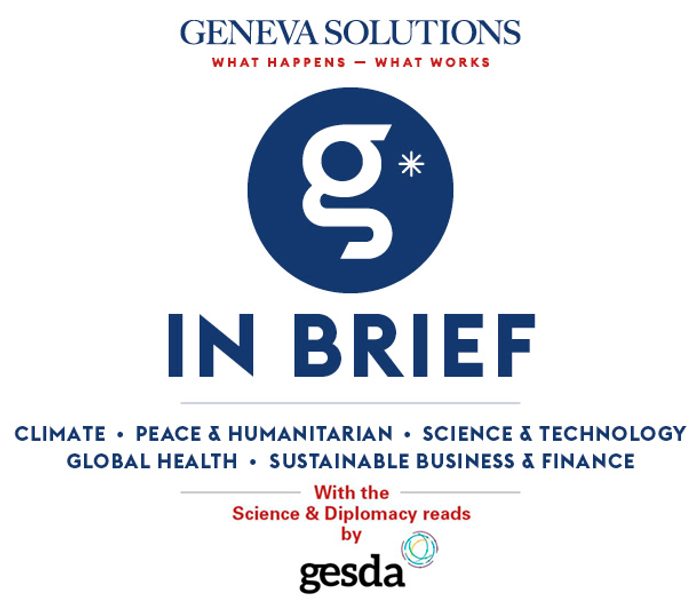Good morning, this is Kasmira. After two days of high-level speeches, promises, pledges and reprimanding, world leaders exited the stage at Glasgow, leaving their delegates and financiers to sort through the “plumbing”, as Mark Carney put it, on how to deliver on those plans.
Among the myriad of announcements on the dedicated finance day, a coalition of 450 institutions said it has $100 trillion ready to deliver on net-zero targets. But not everyone bought into the big-hitting headlines.
Meanwhile in Geneva, the UK's UN representative Simon Manley shares his thoughts on Cop. Plus, a UN investigation on the year-long conflict in Tigray found all sides guilty of committing rights abuses. |

|

Cows gather near the coal-fired power station in Niederaussem, Germany, Sunday, Oct. 24, 2021. (Keystone/ AP Photo/Michael Probst)
|
|
💰 Finance institutions make big promises in Glasgow.
Banks, insurers and asset managers with over $130 trillion of assets have now signed up to hit net zero targets by 2050, UN climate and finance envoy Mark Carney announced on Wednesday as he presided over the third day of Cop26 focused on deciphering the trillions of dollars needed to fight the climate crisis.
Geneva Solutions (EN)
|
|
Here's what else is happening
|

On the facade of the United Nations building in Geneva, a video shows a dinosaur warning humans of the risk of species extinction, on 3 November. (Credits: Geneva Natural History Museum/Philippe Wagneur).
|
|
Great evils require great remedies
– which the UN Development Programme (UNDP) takes quite literally. After a first stop at the General Assembly in New York, its new mascot, a talking dinosaur named Frankie, settles on the front of UN Geneva and the Museum of Natural History. The two are partnering on nine days of cultural activities aimed at involving Geneva residents in climate action. Over in Glasgow, the scolding dinosaur was met with mixed success: although more than 100 countries pledged to stop deforestation, neither Russia nor China’s leaders, among the biggest polluters in the world, attended the conference.
|
|
|
Science and diplomacy reads by GESDA
|
|

(Pixabay)
|
|
Are grant reviewers of funding programs biased against novelty?
“A new study finds that at least one funder wasn’t wild about researchers with records of pursuing out-of-the-box ideas: those who applied to Sinergia, a grants programme at the Swiss National Science Foundation” (SNSF), explains an article in the reference magazine Science, noting however that “the study was limited to a single SNSF funding programme”. Reviewers may sometimes shy away from novel proposals because they fear the projects won’t produce useful results, explains study author Jian Wang of KU Leuven.
This news echoed a discussion I recently had at the 2021 GESDA Summit with a Nobel-Prize winner in physics, the Geneva astronomer Didier Queloz. In a nutshell, he explained clearly an idea that he informally told me in December 2019 already, in Kourou (French Guyana), where we were both attending the launch of the satellite CHEOPS: that interdisciplinary and most of the time out-of-the-box ideas, which do not belong to one specific siloed field of science, but to many, are difficult to pass the cut, because reviewers admit they lack the full spectrum of knowledge to evaluate fully such proposals.
But his idea has now been broken into pieces, as Didier Queloz has been offered to create at ETH Zurich a new Centre for the Origin and Prevalence of Life in the Universe, which will largely be interdisciplinary, involving chemists, geologists, physicists, biologists, astronomers, etc… With one hope: “You try to break it down to a level that everyone can really understand, and only then you spark new ideas and can really develop new research”, he explained to Swissinfo.ch (read below), concluding that ”with a situation where Switzerland is struggling to find its precise relationship with the European Union, I think having an extraordinary scientific goal helps to build links with industries, with other universities and other countries. So, we're introducing some inspiration into society.”
Queloz didn’t tell me if he requested money to the Sinergia programme. But the good news is already that, while the aforementioned study had been made on applications to Sinergia submitted from 2008 to 2012, “the programme moved, in 2016, to encourage novelty by explicitly soliciting proposals for “breakthrough” and interdisciplinary research”, explains Science.
Olivier Dessibourg
(EN)
|

This selection is proposed by the Geneva Science and Diplomacy Anticipator
GESDA, working on
anticipating cutting-edge science and technological advances to develop innovative and inclusive
solutions for the
benefit of the planet and its inhabitants.
|
|
GS news is a new media project covering the world of international cooperation and development. Don’t hesitate to forward our newsletter!
Have a good day!
|

|
|
Avenue du Bouchet 2
1209 Genève
Suisse
|
|
|
| |











